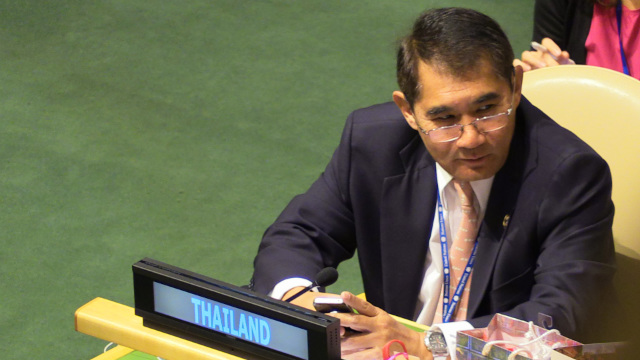SUMMARY
This is AI generated summarization, which may have errors. For context, always refer to the full article.

UNITED NATIONS – Junta-ruled Thailand lost its controversial bid to join the top United Nations body in charge of promoting and protecting human rights.
Thailand was among 5 Asian countries that vied for seats on the UN Human Rights Council but got the least number of votes compared to India, Indonesia, Bangladesh and Qatar.
The UN General Assembly elected 15 new members of the 47-member Council on Tuesday, October 21, at the UN Headquarters here in New York. The new members will serve a 3-year term starting on January 1, 2015.
With only 4 Asian seats available, Qatar edged out Thailand with 142 votes compared to Bangkok’s 136. India got the most votes with 162, Indonesia with 152, and Bangladesh with 149.
A majority of 97 votes was the minimum requirement. The UN has 193 member states.
Last week, Malaysia won the Asian seat on the UN Security Council.
Ahead of the elections, human rights groups pressed Thailand to improve its human rights record by lifting martial law, ending censorship, and ceasing arbitrary and secret detention.
The New York-based Human Rights Watch, the Paris-based International Federation for Human Rights, and the Bangkok-based Union for Civil Liberty all called on the Thai government to end martial rule to be a “credible and influential member” of the Council.
Martial law has been in place in Thailand for nearly 5 months since the military grabbed power from the government in a May 22 coup.
At the UN General Debate in September, Foreign Minister General Tanasak Patimapragorn justified the coup as necessary because the opposing political parties were “unwilling to compromise for the sake of the country” and caused a political impasse.
In a letter to Thai Prime Minister General Prayuth Chan-ocha on October 18, Human Rights Watch said Thailand’s pledges to promote human rights cannot be taken seriously so long as the country is under “abusive military rule.”
“Thailand’s declarations supporting rights without action to revoke military law and end the repression of speech, association, and peaceful protest will be easily ignored,” said Human Rights Watch Asia director Brad Adams.
Human rights groups pointed out that the junta ordered the media not to criticize the military, censored critical stories, and banned public gatherings of more than 5 people.
Rights activists also noted that the junta even arrested protesters who peacefully expressed dissent by showing a 3-finger Hunger Games-inspired salute, and read George Orwell’s 1984 novel in public, or played the French national anthem “La Marseillaise.”
Based in Geneva, Switzerland, the UN Human Rights Council addresses human rights violations and makes recommendations on them. It discusses thematic human rights issues, reviews countries’ rights records, and acts on complaints.
Members are elected to a 3-year term, and are not eligible for re-election after two consecutive terms.
India, Indonesia re-elected
India and Indonesia won their bids for re-election. The Philippines got one vote, even if it did not campaign for re-election. Manila is already a member of the Council and will end its term this year.
In its campaign, Indonesia pledged to promote religious freedom and tolerance as the world’s third largest democracy, and the biggest Muslim-majority nation. Jakarta is also a key player in the Association of Southeast Asian Nations (ASEAN).
“Indonesia is living proof that democracy and Islam can coexist peacefully, harmoniously and productively. Indonesia also continues to actively promote genuine dialogue to advance human rights causes,” Indonesia said in a note verbale to the UN General Assembly.
Indonesia cited its initiatives in the region including the Bali Democracy Forum, the Asia-Pacific Regional Interfaith Dialogues, the International Conference of Islamic Scholars and the New Asian-African Strategic Partnership Ministerial Conference on Capacity-Building for Palestine.
Yet human rights groups have also expressed concern about Indonesia’s rights record, drawing attention to growing violence and discrimination against religious minorities, local decrees that violate women’s rights, corruption, and mistreatment of refugees and migrants.
Qatar has also not escaped criticism.
UN Watch, an observer NGO at the Council, said Qatar poorly treated migrant workers, denies basic rights to women like being elected to the Shura legislative council, and allegedly finances terrorist groups like the Islamic State of Iraq and Syria (ISIS) and Hamas.
This is not the first time countries with questionable human rights records were elected to the Council. In the past, nations like Cuba, Saudi Arabia, China and Russia won seats to the body.
Costa Rica also loses polls
Besides Thailand, Costa Rica was the other candidate that lost a seat but for the Latin America and Caribbean States group.
The other regional groups agreed on their candidates, presenting a so-called “clean state.”
The 15 new members of the Council are:
- Albania
- Bangladesh
- Bolivia
- Botswana
- Congo
- El Salvador
- Ghana
- India
- Indonesia
- Latvia
- Netherlands
- Nigeria
- Paraguay
- Portugal
- Qatar
– Rappler.com
Rappler multimedia reporter Ayee Macaraig is a 2014 fellow of the Dag Hammarskjöld Fund for Journalists. She is in New York to cover the UN General Assembly, foreign policy, diplomacy, and world events.
Add a comment
How does this make you feel?
There are no comments yet. Add your comment to start the conversation.